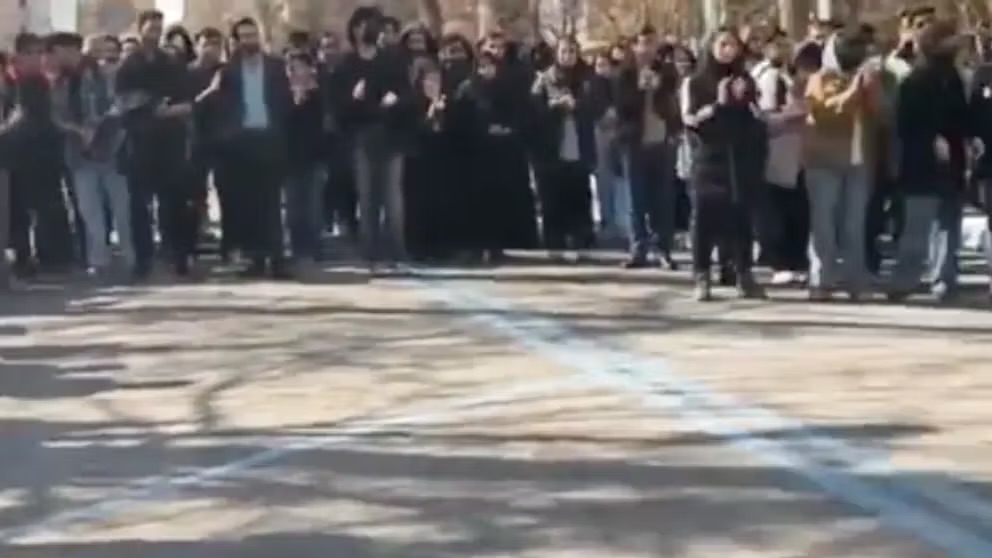Student’s death sparks unrest and protests in Tehran
Amir Mohammad Khaleghi, 19, was stabbed by "muggers" last week near the campus of the University of Tehran, triggering protests against insecurity and university administrators. The government denied rumours that protesters were arrested. To mark the anniversary of Iran’s Islamic revolution, two journalists who had uncovered Mahsa Amini’s killing were pardoned.
Tehran (AsiaNews) – In Iran, university students continue their street protests following the killing of Amir Mohammad Khaleghi, a 19-year-old undergraduate studying business management at the University of Tehran.
The young man was stabbed to death by “muggers” last Thursday evening near the university under mysterious circumstances, which raise doubts among students and young people about security and public order.
Students reacted with marches and rallies that have spread from the capital to other parts of the country.
Fearful of possible escalation, police and the regime’s clerical leaders are closely monitoring events. Even a crime story might escalate, sparking tensions in a country weighed down by a severe economic crisis exacerbated by Western sanctions and in the crosshairs of Israel and the United States over its nuclear programme, now more than ever with the return of Donald Trump to the White House.
Against this backdrop, various rallies have been held in recent days with the support of student organisations.
Protesters at the University of Tehran called for student solidarity, chanting: “If we don’t unite, we’ll be killed one by one”.
A group of students from the university’s Faculty of Fine Arts marched, chanting, “We don’t want spectators, join us,” and “Shout, student, cry out for your rights,” encouraging other students to join the protests.
Several groups and associations issued statements condemning Amir Mohammad Khaleghi’s killing.
A group of students from Allameh Tabataba’i University said that “this incident not only highlights the existing insecurity in educational institutions but also further exposes the irresponsibility and incompetence of university administrators and relevant authorities.”
Their statement further noted that “the government is currently incapable of ensuring any aspect of security – economic, social, or psychological – for the people” and that “its only sustained strategy is widespread and systematic repression.”
The students stressed that “poverty and social inequality have fuelled crime in society, affecting even university campuses.”
Protests began on Friday, with a sit-in at University of Tehran’s dormitory complex. Quickly security forces and plainclothes agents surrounded the campus, arresting four students.
Although the students were eventually released under pressure from their peers, reports of excessive force, including one protester sustaining a broken nose, have fuelled the outrage.
Amir Mohammad Khaleghi was ostensibly stabbed to death by "muggers" near the university, but so far no one has been arrested.
Reacting to the student protests, Science Minister Hussein Simayee Sarraf apologised, but also claimed that no one was arrested. He also announced plans to install surveillance cameras and security kiosks in vulnerable campus areas.
For its part, the Tehran Prosecutor's Office said it had assigned a special investigator to the case.
Finally, two journalists who had uncovered the death of Mahsa Amini in September 2022 at the hands of the morality police were pardoned and cleared of any charge.
The young Kurdish-Iranian woman died in custody after she was detained upon leaving Tehran Metro. Her death triggered a massive wave of protest, centred on the hijab (the Islamic head cover) with people shouting “Woman, life, freedom”, which led to a crackdown that left a long trail of blood.
The Mizan News Agency reported that Elaheh Mohammadi and Niloofar Hamedi had been sentenced to 12 and 13 years in prison respectively, by an Iranian revolutionary court in 2023.
Both were temporarily released last year after spending 17 months behind bars and later acquitted of “collaboration with the United States” in an appeals court; however, other charges, such as “colluding against national security” and “propaganda against the regime” remained.
After Iran’s supreme leader Ali Khamenei approved their pardon on the anniversary of the 1979 Islamic revolution, the remaining charges were dropped, and the legal cases against the journalists are now closed.
16/11/2022 19:03
21/03/2023 13:56







.png)










